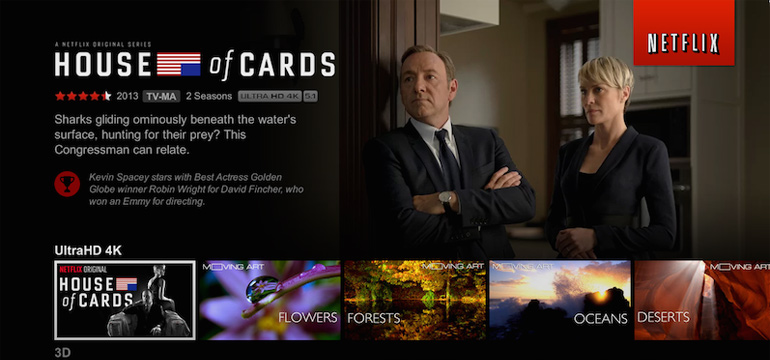
There is an irony — albeit a bitter one — when a company expands to virtually every corner of the globe, yet begins rolling out a policy of stifling access. This is the peculiar situation Netflix has found itself in this month, as it is now in 190 countries, yet begins to restrict browsing through foreign catalogues using VPN services.
A perception that continues to exist today is that Netflix’s Canadian library is paltry, paling in comparison to that of the U.S. That was certainly true when the company first expanded into the Great White North back in 2010, which was about 20% of what was available south of the border. It’s now roughly half, with unique exclusives on either side that makes the dichotomy a little more interesting.
VPNs, or virtual private networks, primarily act as security tools to cover one’s tracks and stay anonymous when on the Internet, but they serve another purpose. By using an IP address from a different country, it becomes possible to access geo-restricted content. This has made Netflix’s various other libraries accessible, effectively offering almost everything the company has for the price of accessing one.
It was a great deal, and one more and more Canadians were reaping the benefits from. Now, Netflix is looking to slam the door shut, and has already begun in earnest in Australia. The restrictive wave will arrive here in the coming weeks, possibly sooner.
While it may seem like Netflix is on the wrong side of a carrot-and-stick approach, the company is caught in a position where the studios and rights holders have pushed hard to have their licences respected. Without those deals, there wouldn’t be much content to stream. Simplistic as that may sound, that’s basically what it boils down to.
What’s at stake here is the anachronistic system of regional and national rights that have governed how and who can broadcast or distribute content to consumers. Netflix’s worldwide reach and popularity puts it in an ideal position to disrupt that entirely and make content available everywhere, regardless of country. That won’t happen tomorrow, so an unfortunate cat-and-mouse game looks to ensue for the foreseeable future.
Blocking VPN services has been done before, particularly by Hulu, the video streaming service that never expanded outside of the U.S. While initially successful, the attempt has ultimately been a failure because the services have proven to be nimble enough to thwart their efforts. While it is unclear how far Netflix is willing to go to maintain this virtual wall, it’s safe to assume VPN providers will rise to the occasion and tunnel through. One route may be blocked, where another will then appear.
Sound familiar? It should be, because this is how digital piracy flourished. Music downloads went through several different iterations of peer-to-peer software that freely distributed music. Video soon followed, with torrents becoming a huge thorn in the side of studios losing out on millions in revenue. Each time one service was shuttered, another one, two or three emerged to take its place. They don’t die, they multiply. Unless, of course, you make content available at a fair price with few restrictions.
The jury may still be out on how viable a business model streaming music is, but it has likely reduced music piracy. It’s also reduced legal music downloads, but that’s another story. The point is that consumers are happy to pay to access content legally, yet expect it to be on-demand. When one subscriber hears that another has access to something they don’t, despite paying the same price, it doesn’t seem fair. Rights holders will say the same thing: we pay to have the licence for that show or movie in one jurisdiction. When you skirt that by watching it from somewhere else, we get nothing for it.
Both sides make sense, which is why Netflix is presiding over a broken system. If rights were worldwide, neither side would have a grievance, but that’s not how the world is — yet. So, as is, the company is in a lose-lose situation. It will lose face with the very international customers it’s hoping to gain by moving into so many countries, while also inevitably losing the battle to keep VPN users at bay.
The other side of this argument is that VPNs were also a foil for ISPs (Internet Service Providers), who tended to throttle connections, particularly when it came to Netflix. The streaming service accounted for 36.5% of overall downstream bandwidth at peak times in North America in 2015, according to Sandvine, a Waterloo, ON-based bandwidth firm. That’s a staggering figure.
Canada’s largest ISPs have lobbied to have VPNs curtailed or banned outright at various times — a clear indication that they feel threatened by their consumer adoption. Netflix never did, and it can be argued that proliferation of VPNs actually accelerated its customer base outside the U.S. It’s not easy to quantify, but it would be hardly surprising to find out that a significant chunk of non-U.S. subscribers were regularly browsing and viewing what’s available stateside.
That will probably continue, in spite of Netflix’s efforts to stem the tide. After an initial blip, the gates will open freely once again. And again.




The funniest thing about this is when tv shows are first run there is never a problem viewing them on either side of the border. I could watch “30 Rock” on NBC just as easily from Vancouver or Los Angeles, but now that the show is a “re run” I can’t.
The business model makes no sense whatsoever.